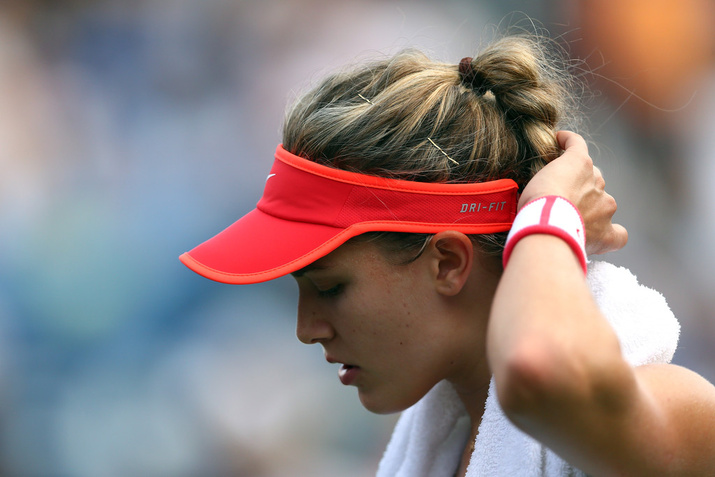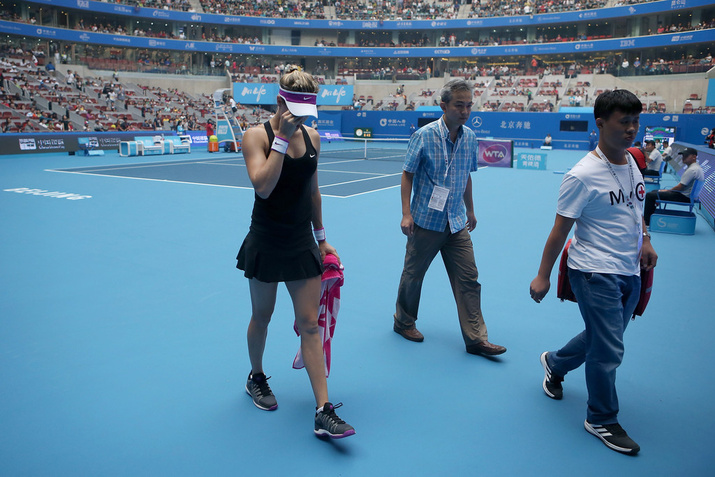Don't miss any stories → Follow Tennis View
FollowEugenie Bouchard and the Concussion Conversation
After a breakout season in 2014, this year has been one to forget for Eugenie Bouchard. The term “Murphy’s Law” has been in full effect as anything that could go wrong has. But on-the-court struggles have taken a backseat as the Canadian deals with a bigger issue now.
Bouchard became one of the most popular players last year as she stormed up the rankings and into the final of Wimbledon and the semifinals at Melbourne and Roland Garros. Her results led to a peak of world No. 5 that season. She became a media darling, receiving endorsements and what seemed a consistent place in front of cameras around the world.

However, for everything that went right in 2014, the opposite has occurred this year. It appeared to be business as usual when this season began as Bouchard advanced to the quarterfinals at the Australian Open. But she would win just five matches between the first major and the U. S. Open and during this stretch was a winner just once between the months of March and June. She suffered first-round exits at both Roland Garros and Wimbledon, and her lack of success led to coaching changes, a constant search for a successfully refined playing style, and a striking lack of confidence. And it all played out in front of the cameras with tears streaming and frustration bubbling to the surface.
Yet, despite struggling for three-quarters of the season, something clicked for the 21-year-old at Flushing Meadows as she began to show signs of the player who bolted up the rankings just a year ago. Bouchard would advance to the round of 16 and sounded confident after defeating Dominika Cibulkova as she headed towards a matchup against eventual finalist Roberta Vinci. That is when her year took a turn that would put her struggles on the court into a different perspective.
Concussions have been on the front pages with many team sports over the past several years. With research uncovering more insights into the injury, new protocols have been put into effect by many professional leagues as they attempt to keep player safety paramount. The injury is not prominent in the individual sport of tennis, but a concussion was what Bouchard would suffer at Flushing Meadows. However, the injury did not occur on the court, but in the locker room as the star slipped and fell after her match against Cibulkova. Since the incident, she has not been able to complete a match and after retiring at the China Open and withdrawing from Hong Kong, she has essentially pulled the plug on her season.
However, Bouchard is not the only prominent player who has suffered head trauma. In 2010, Victoria Azarenka collapsed during a match at the Australian Open. Initially thought to be a side effect from the heat, it was later deemed that the Belarusian had hit her head in the gym during training earlier and had indeed suffered a concussion. This raises the question whether there are unreported incidents involving head injuries with players, who simply wrote it off as minor and just withdrew from an event with no fanfare. There was a day in the NFL when a player left a game due to having “his bell rung.” We now know that those were much more serious injuries.
Bouchard would be wise to take her time in a return to the tour. It is well documented that the effect and severity of head trauma varies from one athlete to another. It is a tricky injury and one that is still under the microscope as to fully understanding recovery time.

When you think of sports where concussions are prominent, hockey and American football are certainly two that stand out. Interestingly, there are examples of players who were forced out of their respective sports due to repetitive brain trauma and those who could pinpoint one or two incidents. In the NHL, Pat LaFontaine suffered six concussions during his career before finally leaving the sport. Meanwhile, Eric Lindross received a vicious hit during the 2000 playoffs and was never the same player who once won two NHL MVP awards. Certainly, in a sport as physical as hockey, one can debate that the cumulative effect of physicality in general could lead to the eventual harshness of the injury. And tennis obviously does not fall into the category of this sport when it comes to abuse on the body. But this does highlight the effects of concussions with athletes and how different they can be in case by case examples.
Perhaps the Bouchard injury will serve as awareness of the potential for concussions in a sport where it is typically not thought of. And with tennis becoming more physical on the court and a heightened physicality during training becoming standard in preparation, there should at least be a proactive discussion about it. As to Bouchard, the poor results of 2015 likely seem in the distant past as she struggles to return to the court at 100 percent. Hopefully, her upcoming time off will serve to do just that, and she can return to the sport in full health in 2016.










